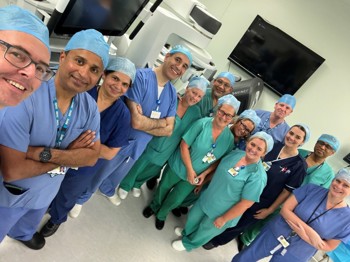Liverpool University Hospitals urology team in NHS first
Thursday, 3 October 2024

Patients being treated for prostate cancer at LUHFT have become the first in the NHS to receive their surgery using the latest da Vinci robotic surgical system, the Single Port (SP).
In April, the Trust was the first NHS trust in the UK to receive the new surgical system, thanks to a generous £1 million donation from the Marina Dalglish Appeal (MDA), and became the first centre in Europe to use it for head and neck procedures.
Urology is now the latest team at LUHFT to be using this new robot, which offers surgeons magnified high-definition view and use of fine instruments for greater precision, resulting in better outcomes for patients - including significantly reduced lengths of stay.
This latest improvement in caring for prostate cancer patients comes 13 years after urology became the first service in the organisation to carry out robotic surgery, when the Trust received its first Da Vinci robot in 2011.
Mr Robin Weston, Consultant Urological Surgeon at LUHFT, was the inaugural surgeon to perform robotic surgery at the Trust over a decade ago. Together with Mr Vishwanath Hanchanale, Clinical Director for Urology and Consultant Urological Surgeon, they carried out these first prostate cancer operations at Aintree University Hospital using the SP last month.
Mr Weston said: “I’m incredibly proud that we have been able to continue providing our patients with this pioneering surgery, and as a Trust remain at the forefront of offering the latest technology so that we can deliver the best care possible for our communities.
“Using the SP for prostate cancer is an exciting step. All our patients so far have been able to go home the day after their surgery, as due to the minimally invasive approach, robotic surgery supports better recovery times and outcomes. We are hoping to also use this new system to offer day-case surgery for prostate cancer, which will be significantly beneficial for our patients, and enable us to offer timely treatment to more people.”